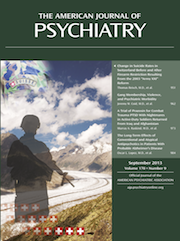Addressing Sleep Impairment in Treatment Guidelines for PTSD
To the Editor: We reviewed Dr. Germain’s article (1) in the April issue with much interest. We would like to kindly correct Dr. Germain’s statement that no treatment guidelines have proposed that the initial treatment for posttraumatic stress disorder (PTSD) should focus on sleep impairment. The PTSD algorithm of the Psychopharmacology Algorithm Project at the Harvard South Shore Program (2), published in 2011, provides treatment guidelines that support exactly the idea that sleep evaluation and treatment should be the first step in assessing and treating PTSD. Notably, the first reference in the Psychopharmacology Algorithm Project article is to previous research by Dr. Germain and colleagues (3).
From a psychopharmacological perspective, the availability of prazosin (4), which has demonstrated a much larger effect size than the selective serotonin reuptake inhibitors (SSRIs), a greater tolerability profile, and a shorter time to response, makes this approach possible. Many experts continue to promote SSRIs as a first-line treatment for this disorder, but the evidence—despite U.S. Food and Drug Administration approval of two SSRIs—remains not at all impressive (5, 6). SSRIs have a small effect size in ameliorating the range of PTSD symptoms, and they frequently exacerbate insomnia and nightmares. Furthermore, they often produce disabling sexual side effects.
For many patients, sleep fragmentation may exacerbate daytime PTSD symptoms (hypervigilance, avoidance, and reexperiencing), and these symptoms may improve when sleep improves (7). The importance of sleep in regulating trauma-related memories and emotions has significant clinical implications, suggesting that prioritized interventions to correct sleep disturbances may facilitate the psychotherapeutic processing of traumatic events.
1 : Sleep disturbances as the hallmark of PTSD: where are we now? Am J Psychiatry 2013; 170:372–382Link, Google Scholar
2 : The Psychopharmacology Algorithm Project at the Harvard South Shore Program: an update on posttraumatic stress disorder. Harv Rev Psychiatry 2011; 19:240–258Crossref, Medline, Google Scholar
3 : Sleep-specific mechanisms underlying posttraumatic stress disorder: integrative review and neurobiological hypotheses. Sleep Med Rev 2008; 12:185–195Crossref, Medline, Google Scholar
4 : A trial of prazosin for combat trauma PTSD with nightmares in active-duty soldiers returned from Iraq and Afghanistan. Am J Psychiatry 2013; 170:1003–1010 (Epub ahead of print: Jul 12, 2013)Link, Google Scholar
5
6
7 : Nonnightmare distressed awakenings in veterans with posttraumatic stress disorder: response to prazosin. J Trauma Stress 2008; 21:417–420Crossref, Medline, Google Scholar



